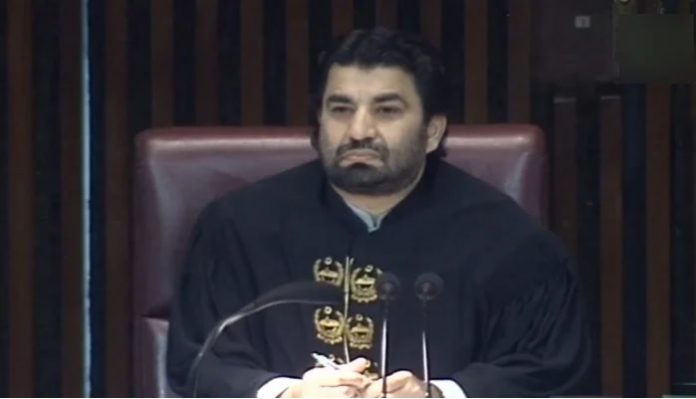National Assembly Deputy Speaker Qasim Suri in his “controversial ruling” declared that “circumstances show that there is a nexus between the no-confidence motion, foreign intervention and the activities of the state’s representatives deputed to Pakistan”.
The four-page detailed ruling given by the deputy speaker was issued by the National Assembly Secretariat on Sunday night.
The deputy speaker declared in the ruling that a “foreign state was interfering in the internal affairs of Pakistan and Prime Minister Imran Khan was its primary target.”
He did not mention the foreign state despite the fact that Prime Minister Imran Khan had already named the US in a slip of the tongue during an address to the nation.
Deputy Speaker Suri said he could not give details about the foreign intentions and its links to the no-confidence motion, but they could be provided in an in-camera session.
He also based his ruling on the recent meetings of the National Security Committee, federal cabinet and Parliamentary Committee on National Security that were briefed on the ‘threat’.
He stated a PCNS meeting was arranged for briefing on the issue on March 31, but the opposition chose to boycott or ignore it. However, as a speaker and custodian of the House, he asked the government functionaries to provide him the facts and information subject to the applicable laws, the ruling stated.
Suri claimed “there existed a campaign to oust and remove the democratically elected government headed by Imran Khan through different means, including the motion for no-confidence.”
He said as the custodian of the House he could not “remain indifferent or act as an unconcerned spectator let alone be instrumental in this unconstitutional act of change of government and the prime minister orchestrated by a foreign state.”
The no-confidence motion could not be entertained in these circumstances and had to be rejected, he explained.
DEPUTY ATTORNEY GENERAL’S OPINION: Raja Khalid Mehmood Khan, who resigned on Sunday, told a TV channel that “something like this can be expected by a dictator, but this has never happened in Pakistan’s history under a democratically elected leader.”
He claimed he was not consulted and in his opinion neither was the attorney general.
He termed the deputy speaker’s ruling unconstitutional.
“I am of the considered view that the case against Imran Khan falls under Article 6 (treason).”
RULING DEFENDED: Lawyer Faisal Chaudhry, a brother of former information minister Fawad Chaudhry, defended the ruling, saying certain judgements of the Supreme Court put Article 5 of the Constitution “above all other matters”, and that the apex court would have to take a deeper look into ‘Lettergate’.
AITZAZ AHSAN: Lawyer and PPP leader Aitzaz Ahsan was of the view that if the no-trust motion was against the rules the speaker’s office should have rejected it without bringing it on the assembly’s agenda. Once the resolution had been placed on the agenda, it became property of the House.
Supreme Court Bar Association President Ahsan Bhoon told reporters outside the apex court that Suri had no option but to put the resolution to vote. The president, prime minister, law minister and the deputy speaker could be tried under Article 6 for treason, he believed.
Meanwhile, the Insaf Lawyers Forum, the lawyers’ wing of the PTI, condemned Bhoon’s statement, and asked the SCBA not to become a party in the political battle.
Senior lawyer Akram Sheikh regretted this was the first government that had bulldozed the Constitution and the rule of law under the guise of democracy. He explained Article 5 could not be invoked at this stage since the assembly session was called for counting of votes on the no-trust motion.









